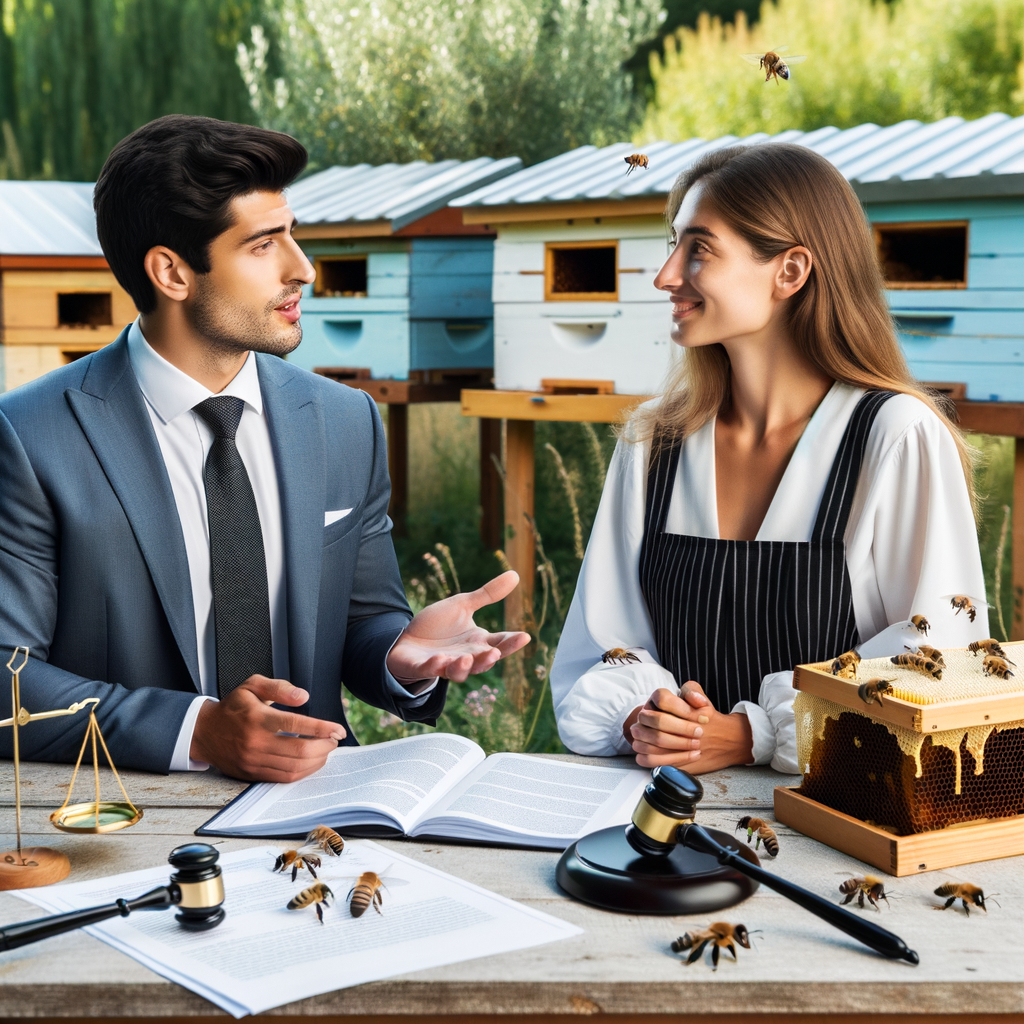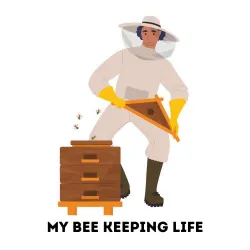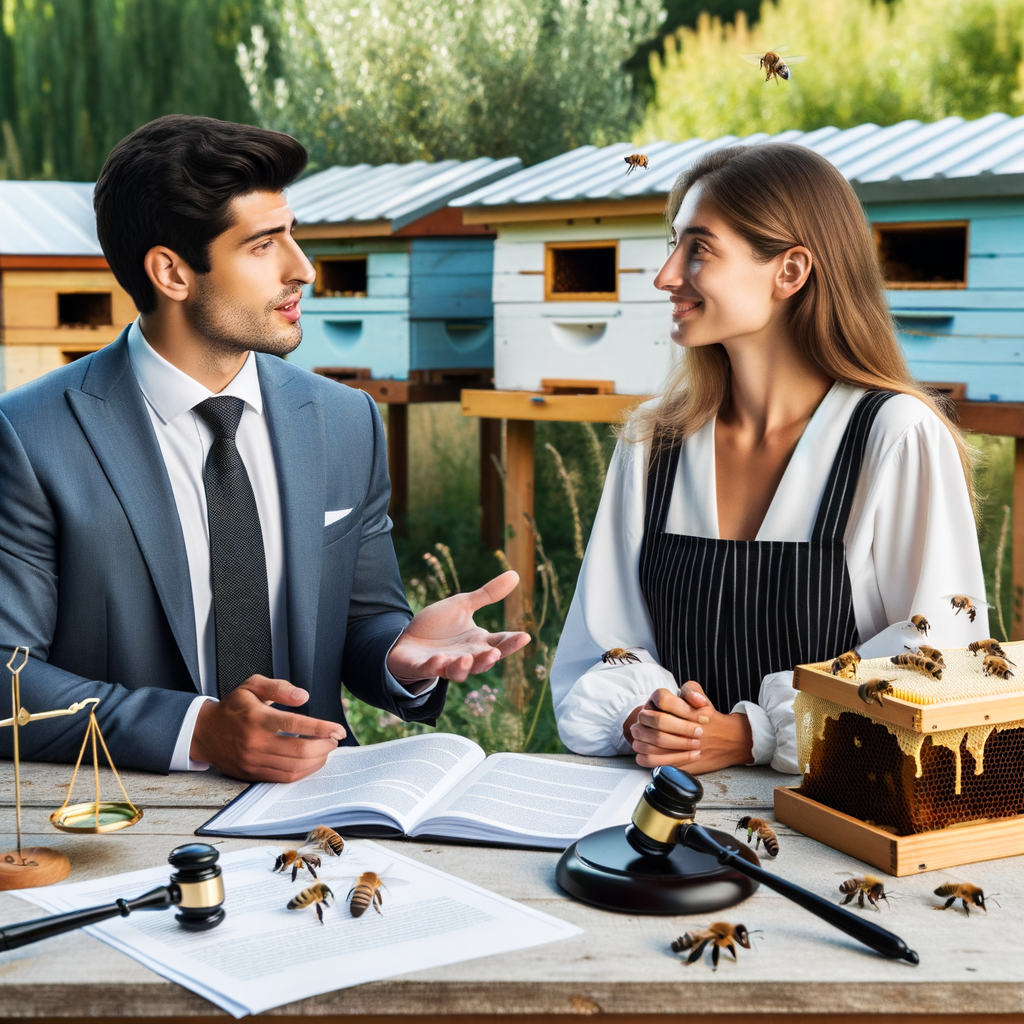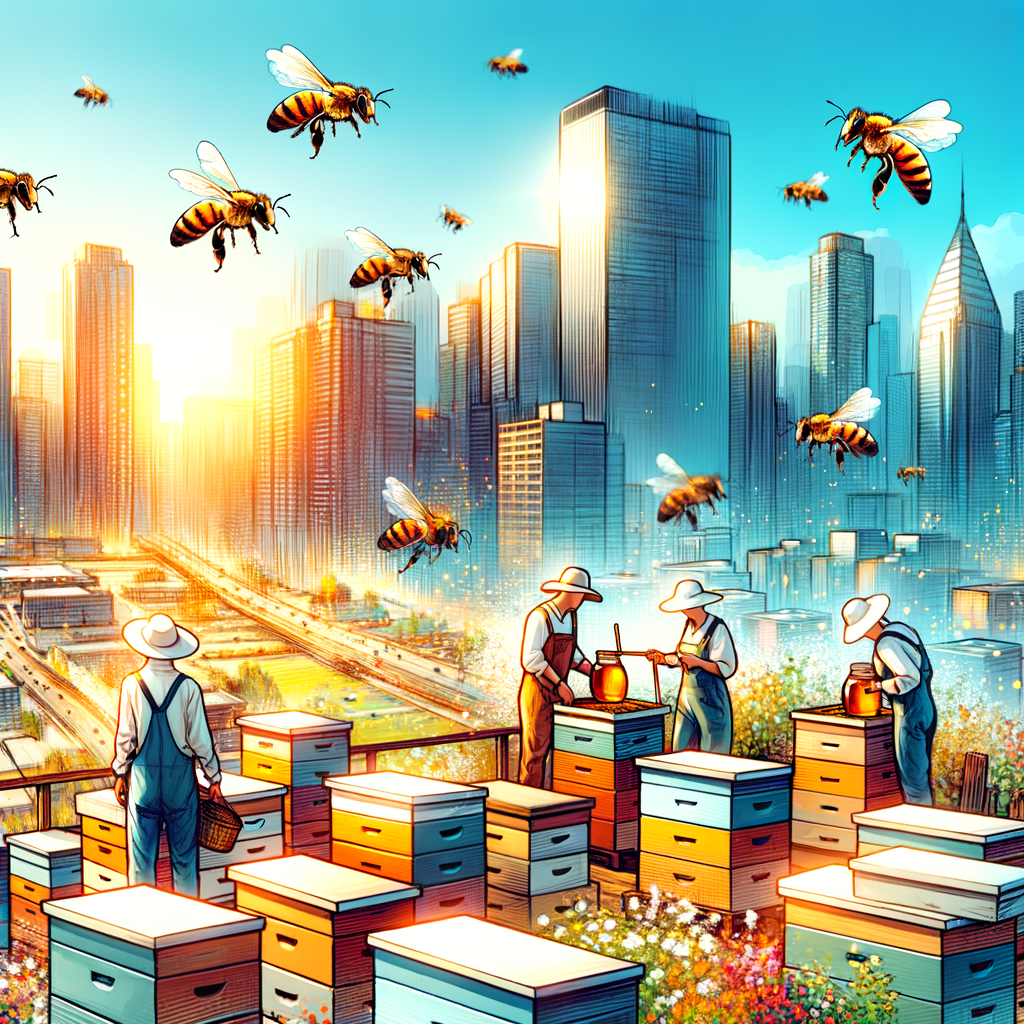
Introduction to Beekeeping Laws
As the world becomes more aware of the crucial role bees play in our ecosystem, the interest in beekeeping has significantly increased. However, like any other activity, beekeeping is governed by specific laws and regulations. This section aims to provide an introductory understanding of beekeeping laws and their importance.
-
- Understanding the importance of beekeeping regulations
Regulations in beekeeping are not just rules to follow; they are essential guidelines designed to protect both the bees and the beekeepers. These laws help maintain the health of the bees, ensure the quality of the honey produced, and safeguard the environment. They also help prevent the spread of diseases that can be detrimental to bee colonies. Understanding these regulations is crucial for anyone interested in beekeeping, whether as a hobby or a business.
-
- Legal aspects of beekeeping: An overview
The legal aspects of beekeeping vary from one region to another. Some common legal considerations include the registration of bee hives, zoning laws, and health and safety regulations. For instance, in some areas, beekeepers are required to register their hives with local agricultural authorities. This helps in tracking the health of bee populations and managing potential disease outbreaks. Zoning laws, on the other hand, may dictate where hives can be placed, especially in urban areas. Health and safety regulations ensure that beekeepers follow best practices to protect themselves, the public, and the bees.
In the following sections, we will delve deeper into the specific legal requirements for beekeeping, how laws are protecting the bees, and how beekeepers can navigate these legal issues. We will also look at some case studies to better understand the application of these laws. By the end of this article, you will have a comprehensive understanding of beekeeping laws and how they impact you as a beekeeper.
Legal Requirements for Beekeeping
Understanding the legal requirements for beekeeping is crucial for every beekeeper. One of the primary legal requirements is the registration of beehives. Let’s delve into why this is necessary and how you can register your beehive.
Registration of Beehives
Registering your beehive is not just a legal requirement, but it also plays a significant role in the protection and management of honey bees. Here’s why:
-
- Why registration is necessary
Registration of beehives helps in tracking the health and population of honey bees. It allows local authorities to monitor the spread of diseases and pests, and take timely action to prevent them. It also helps in the collection of important data about honey bees, which is crucial for research and policy-making.
-
- How to register your beehive
Registering your beehive is a straightforward process. You need to contact your local county or state department of agriculture or the relevant beekeeping association. They will provide you with a form to fill out with details about your beehive, such as its location and the number of colonies. Once you submit the form and pay a small registration fee, your beehive will be officially registered.
Remember, registration is not just a legal requirement but a responsibility towards the well-being of the honey bees. So, make sure you register your beehive and contribute to the protection and conservation of these vital pollinators.
Location and Zoning Laws
One of the most important aspects of beekeeping is understanding and adhering to local zoning laws. These laws can vary greatly from one location to another, and it’s crucial to be aware of the specific regulations in your area before setting up your apiary.
-
- Understanding zoning laws for beekeeping
Zoning laws are rules and regulations set by local governments to control the use of land within their jurisdiction. For beekeepers, these laws can dictate where you can keep your bees, how many hives you can have, and what kind of structures you can build for your apiary.
For example, in some areas, beekeeping may be allowed only in agricultural zones, while in others, it may be permitted in residential areas as well. Some cities may require beekeepers to keep their hives a certain distance away from property lines or public spaces. Violating these laws can result in fines or even the removal of your hives.
It’s important to do your research and understand the zoning laws in your area before you start beekeeping. You can usually find this information on your local government’s website or by contacting your local zoning office.
-
- Choosing a legal location for your apiary
Once you understand the zoning laws in your area, the next step is to choose a suitable location for your apiary. This location should not only comply with local laws, but also be conducive to the health and productivity of your bees.
Bees need a diverse range of flowering plants for foraging, so a location with plenty of flowers and other vegetation is ideal. They also need access to a clean water source. The hives should be placed in a spot that gets morning sun but is shaded in the afternoon, as bees prefer cooler temperatures.
Remember, the location of your apiary can greatly affect the success of your beekeeping venture. So, take your time and choose wisely.
In conclusion, understanding and adhering to zoning laws is a crucial part of beekeeping. It not only ensures that you are operating within the law, but also helps to maintain a harmonious relationship with your neighbors and the wider community.
Honey Bee Law: Protecting the Bees
Bees are more than just honey producers; they play a vital role in our ecosystem. However, they are under threat, and laws have been put in place to protect them. One such law is the Endangered Species Act.
Endangered Species Act and Bees
The Endangered Species Act (ESA) is a key piece of legislation that impacts how we protect our bee populations. It has significant implications for beekeepers and those interested in preserving bee species.
-
- How the Endangered Species Act affects beekeepers
Beekeepers play a crucial role in maintaining healthy bee populations. The ESA affects them in several ways. For instance, if a bee species is listed as endangered, beekeepers may need to adjust their practices to avoid harming these bees. They may also be required to provide certain habitats or food sources for these species. This can be challenging but is essential for the survival of our bees.
-
- Legal considerations for protecting bee species
Under the ESA, it is illegal to harm or kill an endangered species. This includes bees. Therefore, anyone found harming bees could face legal consequences. This law encourages everyone, not just beekeepers, to take steps to protect bees. For example, by planting bee-friendly flowers or avoiding the use of harmful pesticides.
The Endangered Species Act plays a significant role in protecting our bees. It places responsibilities on beekeepers and the general public to ensure the survival of these crucial creatures. By understanding and following this law, we can all contribute to the preservation of our bee populations.
Pesticide Regulations and Bees
When it comes to protecting bees, one of the critical areas of concern is the use of pesticides. Pesticides are substances used to kill pests, including insects that harm crops. However, they can also have a significant impact on bees.
-
- The impact of pesticides on bees
Bees, being insects, can be severely affected by pesticides. These substances can harm bees directly, causing immediate death, or indirectly, affecting their ability to reproduce, navigate, or gather food. According to a study, up to 50% of bees exposed to pesticides can experience these harmful effects. This is a significant concern because bees play a crucial role in pollination, which is vital for our food supply.
-
- Legal restrictions on pesticide use
Given the importance of bees and the harm pesticides can cause, there are legal restrictions on pesticide use. These laws aim to balance the need to protect crops from pests and the need to protect bees. For example, some laws restrict the use of certain types of pesticides known to be particularly harmful to bees. Other regulations require farmers to notify local beekeepers before applying pesticides, giving them a chance to protect their hives.
Indeed, while pesticides are necessary for protecting crops, they can have a significant impact on bees. Therefore, it’s crucial to understand and follow the legal restrictions on pesticide use to protect these vital pollinators.
| Key Points | Details |
|---|---|
| Impact of Pesticides on Bees | Pesticides can harm bees directly or indirectly, affecting their ability to reproduce, navigate, or gather food. |
| Legal Restrictions on Pesticide Use | Laws restrict the use of certain pesticides and require farmers to notify beekeepers before applying pesticides. |
Legal Guide for Beekeepers: Navigating Legal Issues
As a beekeeper, you may encounter legal issues that can be challenging to navigate. This guide will help you understand common legal disputes in beekeeping and how to handle them effectively.
Legal Disputes and Beekeeping
Legal disputes in beekeeping can be complex. They often involve issues related to property rights, nuisance claims, and environmental regulations. Let’s explore these in more detail.
-
- Common legal disputes in beekeeping
There are several common legal disputes that beekeepers often face. These include:
-
-
- Property disputes: These typically arise when bees from one property cross over to another, causing potential damage or nuisance.
- Nuisance claims: These occur when neighbors complain about bee-related issues, such as noise or the risk of stings.
- Environmental regulations: Beekeepers must adhere to certain environmental laws and regulations, which can sometimes lead to disputes.
- How to handle legal disputes
-
Handling legal disputes can be stressful, but there are steps you can take to manage these situations effectively:
-
- Seek legal advice: If you’re involved in a legal dispute, it’s important to seek advice from a lawyer who specializes in agricultural or environmental law.
- Mediation: In some cases, disputes can be resolved through mediation, which involves a neutral third party helping to facilitate a resolution.
- Compliance: Ensure you’re complying with all relevant laws and regulations to avoid potential disputes in the first place.
Additionally, understanding the legal landscape is crucial for beekeepers. By being aware of common legal disputes and knowing how to handle them, you can protect your beekeeping operation and ensure its success.
Insurance and Liability
When it comes to beekeeping, understanding the concepts of insurance and liability is crucial. These two elements play a significant role in ensuring the safety and financial stability of your beekeeping business.
-
- Understanding liability in beekeeping
Liability in beekeeping refers to the legal responsibility you hold as a beekeeper. If your bees cause harm to people or property, you could be held accountable. For instance, if a bee from your hive stings a neighbor, or if your bees damage crops by over-pollinating, you could face legal consequences.
It’s important to remember that bees are living creatures and can be unpredictable. Even with the best management practices, accidents can happen. That’s where liability comes in. It’s a way to protect yourself and others from the potential risks associated with beekeeping.
-
- The role of insurance in beekeeping
Insurance plays a vital role in beekeeping. It provides financial protection against unexpected losses or damages. Various types of insurance policies are available for beekeepers, including liability insurance, property insurance, and even crop insurance.
Liability insurance can cover legal fees and damages if your bees cause harm. Property insurance can protect your hives and equipment from damage or theft. Crop insurance can cover losses if your bees fail to pollinate crops effectively.
Having the right insurance coverage can give you peace of mind and allow you to focus on what you love – beekeeping.
Understanding liability and having the right insurance coverage are key aspects of running a successful and responsible beekeeping business. They not only protect you from financial loss but also ensure the wellbeing of your bees and the community around you.
Case Studies: Beekeeping and the Law
Let’s delve into real-life scenarios to better understand the intersection of beekeeping and the law. Here are three case studies that highlight the legal challenges that beekeepers may face and how they navigated through them.
-
Case Study 1: A Legal Dispute Over Beekeeping
In the small town of Honeyville, a beekeeper named John faced a legal dispute with his neighbor, who claimed that John’s bees were causing damage to his property. John had to prove that his bees were not a nuisance and that he was following all local and state beekeeping laws. After a lengthy court battle, the judge ruled in John’s favor, highlighting the importance of understanding and adhering to local beekeeping laws.
-
Case Study 2: The Impact of Zoning Laws on an Apiary
When Sarah, a beekeeper in the city of Beesville, wanted to expand her apiary, she ran into zoning laws that restricted the number of hives she could have on her property. Sarah had to work with local officials and present data on the benefits of beekeeping to get the zoning laws changed. This case study underscores the need for beekeepers to be aware of zoning laws and be prepared to advocate for their rights.
-
Case Study 3: Navigating the Endangered Species Act as a Beekeeper
Tom, a beekeeper in the state of Buzzington, found himself in a tricky situation when he discovered that his bees were a species listed as endangered. He had to navigate the Endangered Species Act, which required him to take special measures to protect his bees. Tom’s case is a reminder that beekeepers must be knowledgeable about environmental laws and ready to take steps to protect endangered species.
These case studies highlight the complexities of beekeeping laws and the importance of being well-informed. Whether it’s dealing with neighbor disputes, zoning laws, or environmental regulations, beekeepers must be prepared to navigate the legal landscape to protect their bees and their livelihood.
Key Takeaways: Understanding Beekeeping Laws
As we wrap up our discussion on beekeeping laws, it’s important to understand the key points that we’ve covered. These takeaways will help you navigate the legal landscape of beekeeping and ensure the protection of your bees.
- The importance of understanding beekeeping regulations
Understanding beekeeping laws is crucial for anyone involved in this activity. These laws are in place to protect both beekeepers and the bees themselves. They set the standards for how to properly care for bees, where to keep them, and how to handle the honey they produce. Ignorance of these laws can lead to fines, loss of bees, and even legal action. Therefore, it’s essential to familiarize yourself with the regulations in your area.
- How to navigate legal issues in beekeeping
Navigating legal issues in beekeeping can be a daunting task, but it’s not impossible. The first step is to understand the laws in your area. This includes local, state, and federal laws. If you’re unsure, consult with a legal expert or join a local beekeeping association for guidance. In case of any legal disputes, always seek professional advice. Remember, prevention is better than cure, so always adhere to the laws to avoid any legal issues.
- Protecting bees through legal means
Protecting bees is not just an ethical responsibility; it’s a legal one too. Many laws are in place to ensure the survival and health of bees. This includes regulations on the use of pesticides, habitat protection, and disease control. By adhering to these laws, you’re not only protecting your bees but also contributing to the overall health of our ecosystem. After all, bees play a crucial role in pollination, which is vital for our food supply.
In conclusion, understanding and adhering to beekeeping laws is not just about avoiding legal issues; it’s about ensuring the health and survival of your bees. By doing so, you’re contributing to the preservation of our ecosystem and ensuring the sustainability of our food supply.
| Key Takeaways |
|---|
| Understanding beekeeping laws is crucial for the protection of bees and beekeepers. |
| Navigating legal issues in beekeeping involves understanding local, state, and federal laws and seeking professional advice when needed. |
| Protecting bees through legal means contributes to the health of our ecosystem and the sustainability of our food supply. |








